The biggest trick ever played in Indian politics is: The Third Front. Make no mistake about it, the country has never had a Third Front government. The biggest problem with the Third Front is its instability.
Bengaluru: Third Front, by definition, is sans the BJP or the Congress. But the versions of the so-called Third Front the country has had in 1989-91 and 1996-98 were actually backed from outside by either the BJP or the Congress.
So this idea of reviving a non-BJP, non-Cong front now, in the light of TRS chief and Telangana Chief Minister K Chandrasekhar Rao meeting with/talking to a few leaders, looks a bit laughable.
Also, the country's experiences with the (for want of any other description) 'Third Front' governments were not really memorable. Some of the most tumultuous and tension-filled periods of Indian political history in recent times were when the motley group of parties were in charge (?) of the government.
The first experiment was in 1989 when a corruption-tainted Rajiv Gandhi government was voted out unceremoniously by the people. The mood of the nation was decidedly anti-Congress, but the verdict in terms of Lok Sabha seats was fractured. VP Singh, who had resigned from the Rajiv Gandhi Cabinet, had kind of emerged as the rallying force for the opposition. Yet, the “Raja of Manda” could not get a decisive mandate for his party.
The government comprised Janata Dal, Telugu Desam Party, DMK, Asom Gana Parishad, and was propped from outside by the BJP and the Left Parties.
If the Right and the Left coming together was an anomaly, then the government was equally feckless, as it never got going. There was plenty of unseemly drama when the parties got down to choose a leader to head the government. Chandra Sekhar, the leader of the Janata Party then, who had merged his outfit with Jana Morcha to birth Janata Dal, had no love lost for VP Singh. He was always suspicious of Singh, and hence had done a backroom deal where it was apparently agreed upon that Devi Lal would be the consensus Prime Ministerial candidate. Unbeknownst to Chandra Sekhar, Singh had some secret agreement to get himself elected as the Prime Minister.
On the appointed day, the drama that unfolded at Parliament's Central Hall will be remembered for the quirky twists and turns. VP Singh got up to propose Devi Lal's name, who in turn proposed Singh's name back. Chandra Sekhar was stumped by his own man, and he was clearly miffed as he decided to stay away from the cabinet. Also, with Devi Lal's elevation as the Deputy Prime Minister, the title 'Tau' (elder brother) came into Indian political lexicon.
Singh never got going as the Prime Minister as his government was forever bogged down in internal bickering. The BJP, from outside, started the Ram mandir movement, and Singh from inside unleashed the Mandal Commission.
In less than a year, Singh's government fell, but what came to replace it was even more bizarre. With just 64 MPs at his command, Chandra Sekhar became the Prime Minister as he was helped by the Congress to survive the trust vote. In 7 months, the government fell as Rajiv Gandhi was upset by the presence of --- we are not making this up --- two constables outside his house.
With the spectacular fall of the 'national front' government one would have hoped that the dangerous experiment would be buried forever. But alas, the political zombie came back alive in 1996 after the BJP government lasted for only 13 days.
After this, the usual suspects of TDP, SP, DMK, AGP, Left parties, NC, Moopanar's Tamil Maanila Congress, among others, came together to float a 'United Front' with the Congress lending its weight from outside. United was only in the name as the ragtag bunch was mostly fighting among themselves. H D Deve Gowda had the first go as the Prime Minister. His tenure will be most remembered for the functions in which the Prime Minister dozed off.
After the Congress backed off citing lack of communication, Deve Gowda was replaced by I K Gujral, and India got its first Prime Minister with a goatee. There was nothing more to his government, and the Congress again pulled the rug from under its feet in March 1998.
Though the nation never had any more of the Third Front misadventures after this, the UPA governments were unfortunately marked by the same amateur spirit (especially the 2009 one), and the country is still paying for that mistake.
The Third Front has proved to be problematic. That is because it is not an organic pre-poll combination but just an opportunistic coming together of disparate elements in a post-verdict situation.
Stability can never be in its DNA.
